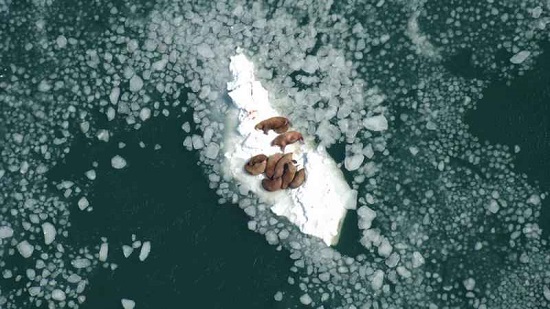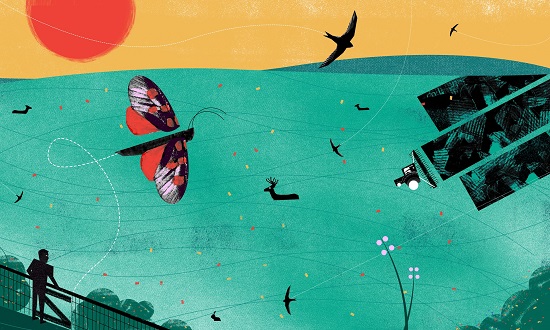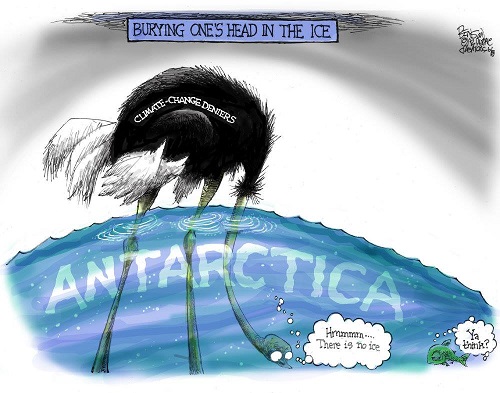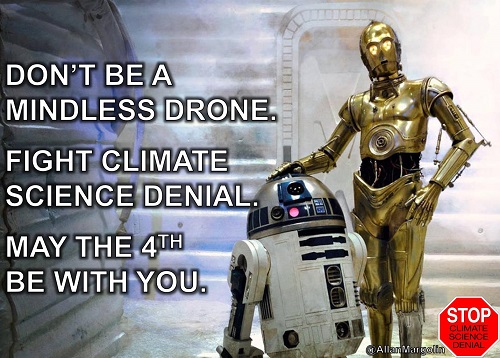2018 SkS Weekly Climate Change & Global Warming Digest #26
Posted on 1 July 2018 by John Hartz
Story of the Week... Editorial of the Week... Toon of the Week... Graphic of the Week... Video of the Week... Coming Soon on SkS... Poster of the Week... SkS Week in Review...
Story of the Week...
Warming of 2C ‘substantially’ more harmful than 1.5C – draft UN report
Latest version of major UN science report concludes the upper temperature goal of the Paris Agreement does not represent a climate safe zone

Walrus use sea ice to rest while hunting. But at 2C the Arctic is "very likely" to be ice-free one year in ten, scientists have found (Photo: Brad Benter/USFWS)
A leaked draft of a major UN climate change report shows growing certainty that 2C, once shorthand for a ‘safe’ amount of planetary warming, would be a dangerous step for humanity.
The authors make clear the difference between warming of 1.5C and 2C would be “substantial” and damaging to communities, economies and ecosystems across the world.
In 2015, the Paris Agreement established twin goals to hold temperature rise from pre-industrial times “well below 2C” and strive for 1.5C.
The Intergovernmental Panel on Climate Change (IPCC) has since been working to assess the difference between those targets, with a view to publishing a sweeping analysis of all available research in October this year.
The report summary, which Climate Home News published on Wednesday, is a draft and subject to change. The IPCC said it would not comment on leaked reports. An earlier draft from January was also published by CHN.
Warming of 2C ‘substantially’ more harmful than 1.5C – draft UN report by Karl Mathiesen, Megan Darby & Soila Apparicio, Climate Home News, June 27, 2018
Also see:
Leaked final government draft of UN 1.5C climate report – annotated by Karl Mathiesen, Megan Darby & Soila Apparicio, Climate Home News, June 27, 2018
Editorial of the Week...
Our natural world is disappearing before our eyes. We have to save it

Illustration by Nate Kitch
It felt as disorienting as forgetting my pin number. I stared at the caterpillar, unable to attach a name to it. I don’t think my mental powers are fading: I still possess an eerie capacity to recall facts and figures and memorise long screeds of text. This is a specific loss. As a child and young adult, I delighted in being able to identify almost any wild plant or animal. And now it has gone. This ability has shrivelled from disuse: I can no longer identify them because I can no longer find them.
erhaps this forgetfulness is protective. I have been averting my eyes. Because I cannot bear to see what we have done to nature, I no longer see nature itself; otherwise, the speed of loss would be unendurable. The collapse can be witnessed from one year to the next. The swift decline of the swift (down 25% in five years) is marked by the loss of the wild screams that, until very recently, filled the skies above my house. My ambition to see the seabird colonies of Shetland and St Kilda has been replaced by the intention never to visit those islands during the breeding season: I could not bear to see the empty cliffs, where populations have crashed by some 90% in the past two decades.
I have lived long enough to witness the vanishing of wild mammals, butterflies, mayflies, songbirds and fish that I once feared my grandchildren would not experience: it has all happened faster than even the pessimists predicted. Walking in the countryside or snorkelling in the sea is now as painful to me as an art lover would find visits to a gallery, if on every occasion another old master had been cut from its frame.
Our natural world is disappearing before our eyes. We have to save it, Opinion by George Monbiot, Opinion is Free, Guardian, June 29, 2018
Toon of the Week...

Graphic of the Week...
All the ice that melted at the South Pole in the past 25 years, visualized with swimming pools.
Antarctica has lost 2.71 trillion tons of ice. Here’s what that looks like. by Umair Irfan & Javier Zarracina, Energy & Environment, Vox, June 27, 2018
Note: The graphics embedded in the above article cannot be reproduced in this document.
Video of the Week...
Ben Strauss on Antarctic Ice Melt with PBS NewsHour
ClimateCentral's CEO and chief scientist Ben Strauss went on air with Hari Sreenivasen of PBS NewsHour to talk through a new study on Antarctic ice melt and what that may mean for coastal cities in the U.S. — particularly on the East Coast. "South Florida is severely at risk particularly because their bedrock is porous. So even if you built levees or protected walls, water would push underneath them come up through the ground. So there are really high stakes here."
Antarctica, a continent of snow and ice, is now losing ice three times faster than it was in 2007. In a new study published last week in the journal Nature, more than 80 scientists from multiple countries use satellite data to examine the Antarctic’s vast ice sheets, and their prediction is that if the current rate of ice melt continues, sea levels could rise six inches by the year 2100.
Ben Strauss on Antarctic Ice Melt with PBS NewsHour, ClimateCentral, YouTube Video, June 18, 2018
Coming Soon on SkS...
- Republicans try to save their party with a carbon tax push (Dana)
- Future projections of Antarctica ice shelf melting (Kaitlin Naughten)
- Guest Post (Joe Robertson)
- 10th run of Denial101x starts on July 10! (Baerbel)
- New research this week (Ari)
- 2018 SkS Weekly Climate Change & Global Warming News Roundup #27 (John Hartz)
- 2018 SkS Weekly Climate Change & Global Warming Digest #27 (John Hartz)
Poster of the Week...

SkS Week in Review...
- 2018 SkS Weekly Climate Change & Global Warming News Roundup #26 by John Hartz
- New research, June 18-24, 2018 by Ari Jokimäki
- What happened last time it was as warm as it’s going to get later this century? by Howard Lee (Ars Technica)
- Trump should inspire us all, but not in the way you might guess by John Abraham (Climate Consensus - the 97%, Environment, Guardian)
- Explainer: How scientists estimate ‘climate sensitivity’ by Zeke Hausfather (Carbon Brief)
- 30 years later, deniers are still lying about Hansen’s amazing global warming prediction by Dana Nuccitelli (Climate Consensus - the 97%, Environment, Guardian)
- 2018 SkS Weekly Climate Change & Global Warming Digest #25 by John Hartz































 Arguments
Arguments






























Some interesting news relating to Scott Pruitt:
"Environmental Protection Agency Administrator Scott Pruitt was confronted while eating at the Teaism restaurant Monday. Teacher Kristin Mink, who was with her son, 2, said: 'I urge you to resign, because of what you're doing to the environment in our country'. Pruitt said nothing during the showdown and left shortly."
Love it. Exactly what he deserves. Some push back. But keep it civil.
Some people consider climate change a big threat .
Do you think it is better to fix Earth than exploring space and using billions of cash just to have a picture of some planets. It is not like we can easily build an empire of than planet.
We still lack technology to explore more of that planet.
Climate Change May Have Claimed A Significant Victim – The Barents Sea